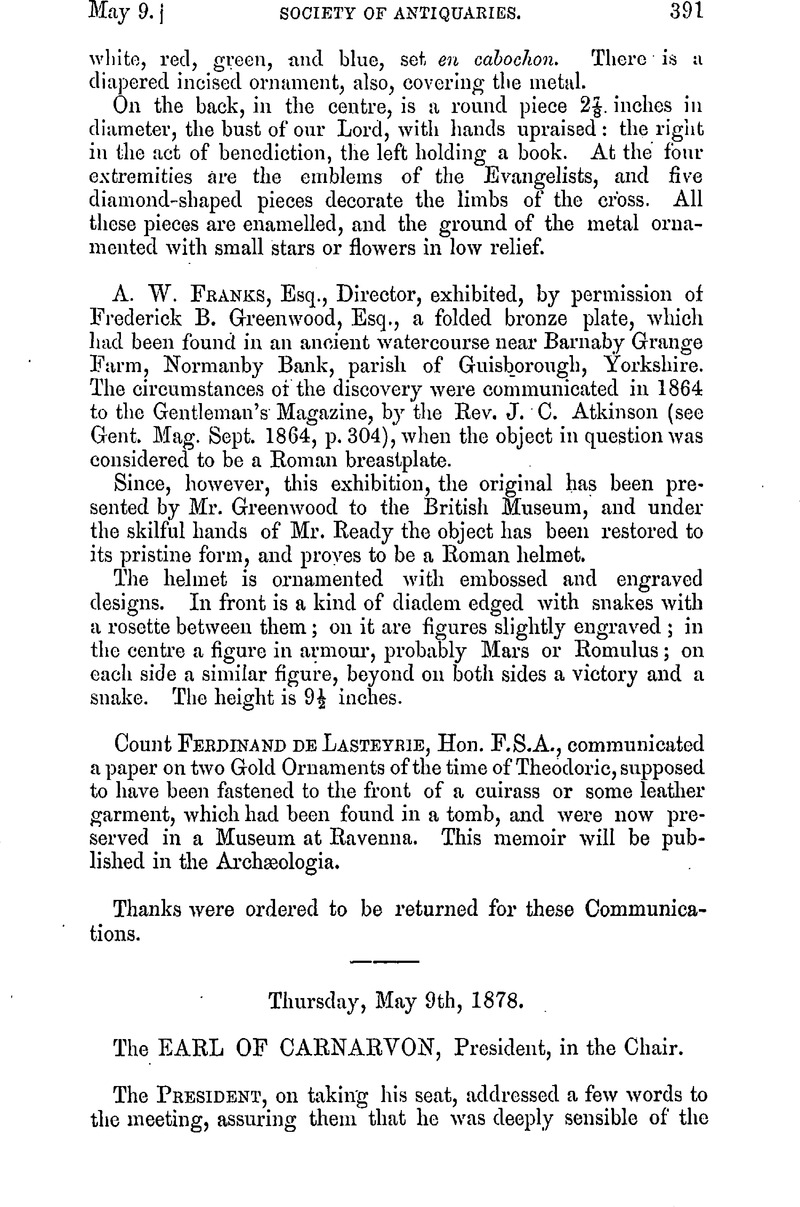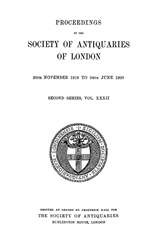No CrossRef data available.
Article contents
Thursday, May 9th, 1878
Published online by Cambridge University Press: 10 May 2010
Abstract

- Type
- Proceedings
- Information
- Copyright
- Copyright © The Society of Antiquaries of London 1878
References
page 395 note * The following is the passage referred to in Beger's Thesaurus (vol. iii. p. 419). It is couched, it will be seen, in the somewhat whimsical form of a dialogue between Dulodorus and Archæophilus :—
“Et nomen et instrumentum mihi obscurum est, infit Archæophilus. Instrumentum Statuariorum est, respondit Dulodorus, qui simulacra ex cerâ, alabastro, aliisque lapidum generibus cædunt et poliunt. Græcis dicitur ἐγκοπεύς quâ voce Lucianus usus est in Somnio, ubi cum lusum non insuavem dixisset, Deos sculperc, et parva quædam simulacra adornare, addit ἐγκοπέα γὰρ τινά μοι δοῦς scilicet avunculus, id quod Joh. Benedictus vertit Celte datâ. Celte ? excepit Archæophilus, at nisi fallor hæc vox Latinis incognita est ? Habetur, inquit Dulodorus, in versione vulgata Libri Hiob. c. 19, quamvis alii non Celte sed Certe ibi legunt, quod tamen minus quadrat.”—Thesaurus Brandenburgicus selectus (vol. iii. p. 419.) Coloniæ Marchicæ. 1696, fol.
page 402 note * The writer of this paper has since received from Mr. Aldis Wright, Fellow of Trinity College, Cambridge, and from Professor Bensley, of the same University, communications of great interest, and of far greater authority than he can lay claim to, which abundantly confirm indeed his theory that celte is a misreading, but which account for the origin of certè on different grounds. Mr. Wright does not believe that certè was intended as a translation of either lêed or lâad. He incloses a list of all the passages where the words occur with the corresponding rendering of the Vulgate. The former is always, he says, translated in testimonium, pro testimonio, in testem; the latter, in æternum, in finem,, in sæculum sæculi, in perpetuum, and ultra. With the Editor of Gregory the Great's Commentary on Job—as quoted above—and, I may add, with other living Hebrew scholars whom I have consulted, Mr. Wright, it will be seen, does not agree: he holds that the Hebrew word has been altogether omitted in the Vulgate. Professor Bensleyæs view of the matter points in the same direction. He maintains that in the Vulgate certè is frequently introduced as an expletive after et, aut, and vel, and especially in order to break the monotony of the diction after aut or velintroducing the last of a series of clauses. The following passages, with which Mr. Bensley has kindly furnished me, seem to bear out this view:—Lev. xiii. 48, In stamine atque subtegmine, aut certè pellis. Judges xix. 13, Manebimus in ea, aut certè in urbe Rama. 2 Sam. xxiv. 13, Aut septem annis veniet tibi fames. … aut tribus mensibus fugies adversarios tuos. … aut certè tribus diebus erit pestilentia in terra sua. 2 Chron. vi. 36, In terram longinquam, vel certè quæ juxta est. Esdr. vii. [26, Sive in mortem, sive in exilium, sive in condemnationem substantiæ ejus, vel certè in carcerem. Neh. xiii. 26, Et certè in gentibus multis non erat rex similiter. Job xiii. 22, Aut certè loquar. Sap. xiv. 28, Aut certè vaticinantur falsa (ἤ προφητεύουσι) Jer. ii. 11, Et certè ipsi. Mal. ii. 17, Aut certè ubi est. I find, however, that certè, in this collocation, has sometimes a corresponding equivalent in the Hebrew, and is not a mere expletive; see Deut. xxiv. 3, 1 Kings xviii. 27, 2 Chron. xxiv. 24, and I venture to think this may also be the case in the passage before us.
Whichever theory be adopted—and the writer will not permit himself to doubt which will have the preference—the word celtis is proved to be destitute of any right to exist.


